
NEWS
NEWS
REPORT
Regarding footcare, a group of diabetes experts is urgently
calling for clearer signposting to speed up access to footcare
teams in order to reduce preventable amputations.
FANCY FOOTWORK
T
he Insights for Diabetes
Excellence, Access and
Learning (iDEAL) Group
group - specialists
spanning diabetes
management, medicine, pharmacy,
dietetics, technology, nursing, psychology,
commissioning and the perspective of
living with diabetes - produced the paper,
'Diabetes and Foot Care Assessment
and Referral', in collaboration with Kings
Podiatrist, Professor Mike Edmonds and
Chris Aldred, aka The Grumpy Pumper.
It comes after figures from Public Health
England 2019 show there were 7,545
major amputations in people with diabetes
in England between 2015 to 2018.
Foot care is a top priority for people
with diabetes. One in three people with
the condition may develop foot ulcers in
their lifetime. These are highly susceptible
to infection that can spread rapidly,
causing tissue destruction or gangrene
resulting in major amputation, and why
rapid access to the right treatment is
needed. To significantly improve foot
care, the paper specifies the following key
recommendations:
• Increased awareness of the risks to
all people living with diabetes to promote
foot health and avoid delays in seeking
help when facing any difficulties.
• Establish a national education
programme with practical information
in an illustrated practical handout for all
people living with diabetes about foot selfcare
and checks from diagnosis onwards.
• Increased access to education in
foot assessment and urgent referral for
ALL Health Care Professionals (HCPs)
working with people living with diabetes.
• Adoption of the 'ACT NOW' acronym
in urgent foot care referrals for people with
diabetes by all HCPs.
• Clarity of referral pathways
is essential for all HCPs to avoid
unnecessary delays and need techniques
to facilitate and enable clarity of pathways
for easy referral.
• For all NHS Trusts to enable people
living with diabetes to self-refer as required
to Multidisciplinary Foot Care Teams
(MDFT) to avoid unnecessary delays.
• NHS Standardisation of evidencebased
provision of MDFT in all NHS Trusts
and referral criteria to reduce postcode
lottery and fragmented services across
the NHS and to comply with the guidance
from The International Working Group of
the Diabetic Foot (IWGDF) (2019).
• Regular audit to assess the impact
on services and demonstrate the need to
increase access to MDFT.
• Call upon professional bodies to
review the annual data from NHS England
and the National Diabetes Audits to
assess the training and support needs for
HCPs to have the necessary capabilities
to address prioritised unmet needs.
Finally, for all Clinical Commissioning
Groups and Primary Care Networks
provide all three care structures of care for
people living with diabetes with diabetes
and foot disease, as recommended by
NICE Guideline, NG19 (2019):
1. Training for healthcare staff to carry
out routine foot examinations
2. A clear pathway for assessment
if someone has new, worsening or reoccurring foot ulcers (in 24hrs if needed)
3. A clear pathway for referral into
a specialist foot protection service
if someone is assessed as being at
increased risk of developing foot ulcers.
To read the paper in full CLICK HERE.
www.idealdiabetes.com